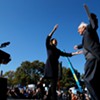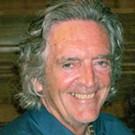Published December 11, 2002 at 10:35 p.m.
You don't hear the term "all-American" used much anymore, except ironically. It signifies an old-fashioned, almost corny set of experiences and values. And that's why "all-American" applies so perfectly to John Tracy.
Just check the résumé of the Burling-ton politician Democrats nominated Saturday to become speaker of the Vermont House next month: second child of eight in Irish-Catholic household headed by conservative dad, a cop, and liberal mom, a teacher; Springfield High School soccer player who attended Catholic Youth Organization summer camps and after-school catechism classes; volunteer for U.S. Army at height of Vietnam War, serving as helicopter door-gunner and rising to the rank of sergeant; married 21 years, 16 of them spent as stay-at-home dad raising five kids and working nights as bartender at Nectar's; basketball coach at St. Joseph's elementary school in the Old North End; and much-liked community activist elected to five terms in the General Assembly.
Tracy's set of references includes his former boss, Nectar Rorris, who calls him "totally honest, a complete straight-shooter, a traditional family man and a real diplomat in dealing with customers." Indeed, it seems almost no one dislikes John Tracy. Even his political opponents have nothing bad to say about the top Democrat in the 150-member Vermont House.
"He's got great personal skills that he uses to bring people together," comments State Rep. Dave Zuckerman, a Burlington Progressive. "He's quite personable, a charming guy," adds State Rep. Kurt Wright, a New North End Republican. "John is well liked right across the spectrum, by people who agree and disagree with his politics."
Affability and inclusiveness are key qualities that have brought Tracy to the threshold of one of the most powerful political posts in Vermont. But will he be able to cross it?
No one can confidently predict the outcome of the secret ballot by which the House's 74 Republicans, 69 Democrats, four Progressives and three Independents will choose a speaker. Many analysts suggest, however, that the result will hinge on whether Tracy is able to keep all of the Democratic House members on his side.
None of them will defect, Tracy insists, but Wright is just as sure that at least a couple Democrats will end up supporting Republican Walter Freed, the current speaker.
Some Democrats say in private that Tracy may be too liberal for their tastes, Wright and other Republicans report. In that respect, Wright suggests, the Progressives' recent endorsement of Tracy could prove a kiss of death. It may confirm, for a couple of conservative Democrats, that their views are more aligned with Freed's than with those of their own party's candidate for speaker.
Geographic factors may also work in favor of Freed, who lives in Dorset. State Rep. Albert Krawcyzk of Bennington, who recently switched party allegiance from Democratic to Republican, says he's most concerned with advancing the interests of his southern county. "And I'm afraid that if Tracy becomes speaker, everything will be tilted from Rutland, north."
Noting that his own roots lie in southern Vermont, Tracy pledges that as speaker he would take account of all the state's House districts, not just his own Old North End bailiwick. As for his political beliefs, Tracy first describes himself as a pragmatist - "someone who's shown ability to reach across boundaries to get things done." It's only after some gentle prodding that he acknowledges, "Yes, I'm a liberal. Of course I am."
Tracy also says, "I'm incredibly proud to be a Democrat. I'm a loyal member of a party that has stood for a very long time for women's rights, labor and human rights."
It's that strong devotion to party that accounts primarily for the tension in Tracy's relationship with Burlington Progressives - tension the Progs' endorsement hasn't entirely soothed. And while Tracy may be a liberal, that doesn't mean he's an ideological clone of the Progressives.
"We have plenty of differences with John on a number of issues," Zuckerman says, citing his own firm espousal of a single-payer health-insurance system, compared to Tracy's noncommittal stance on how a universal health-care system should be financially structured in Ver-mont. Progressive State Rep. Steven Hingtgen, who co-represents the same Old North End district as Tracy, points further to the Democrat's support for the Circumferential Highway, which most Progressives oppose.
"We haven't entirely figured out how to co-exist," adds Hingtgen, who has run against Tracy in the same two-member House district on four occasions.
Ever since the early '80s, the Old North End has been the bedrock of the Progressives' electoral success, and they don't take kindly to Tracy's powerful presence there. Similarly, the Demo-crats are not willing to concede the Old North End to what many of them still view as an upstart party.
In their most recent run-in, the Progressives accused Tracy of putting Democratic interests ahead of Burlington's in a battle over redistricting. It ended with dependably Democratic Win-ooski gaining effective control of a House seat that might have proved winnable for the Progs.
Sectarian squabbling is to be expected, however, in tri-partisan Burlington. Sometimes, too, the inter-party antagonism has a peacock-like quality; it's more of an instinctive display than a life-or-death showdown. Such appears to be the case with the mayoral contest between Progressive incumbent Peter Clavelle and Democratic challenger Andrew Montroll, a city councilor.
Tracy says he will support Montroll, and the Progressives accept that the Democrats' leader in the Vermont House could not do otherwise. But Tracy also acknowledges that the rationale for Montroll's race is not self-evident. He himself could not find a compelling reason to run against Clavelle, Tracy says when asked whether he harbors mayoral ambitions of his own. "It's something I might consider doing a few years down the road. But right now I see my role as being in the legislature. There's so many moving parts in the legislature; that's what I love about it."
His colleagues in Montpelier agree that Tracy excels at the politicking involved in fashioning compromises on various issues. Some House members say privately, however, that Tracy lacks an in-depth understanding of policy matters. Both Democrats and Republicans point out that his record over the past eight years is long on consensus building, short on legislative wonkery.
Hingtgen puts it this way: "John is someone who's less interested in policy and more in process."
Describing how he would perform as speaker, Tracy puts equal emphasis on issues and stylistic factors. The legislative agenda he envisions consists of traditional liberal items that would entail both offensive and defensive strategies.
In addition to "making progress on a universal health-care plan," Tracy wants Vermont to play a leading role in cutting prescription-drug costs for seniors. He says Vermont should promote economic development along the lines suggested in a book he's been reading: The Rise of the Creative Class, in which author Richard Florida argues that entrepreneurs and fast-growing companies prefer to locate in areas with lively cultural scenes, strong medical and educational institutions and a commitment to tolerance. "That's what Ver-mont is all about," Tracy says. "We should be selling those points more aggressively."
Two cornerstones of Ver-mont's liberal legislative legacy must be protected, Tracy adds. He says he would countenance some changes in both Act 60 and Act 250 as long as the principles underlying the respective laws were left undisturbed. Equality in education financing is a non-negotiable premise, in Tracy's view - as is the environmental protection incorporated into Vermont's development-review process.
Under certain circumstances, the speaker of the House can play a decisive advocacy role in the crafting of legislation. But such circumstances will almost certainly not prevail during the next biennium, when either Freed or Tracy will struggle to manage a House divided almost exactly evenly along political lines. Tracy would have the added challenge of working with a Republican governor, while Freed would have to take account of the Democrats' unbreakable hold on the State Senate.
Michael Obuchowski, the last Democrat to sit in the speaker's chair, enjoyed the advantage of a comfortable Democratic House majority during much of his tenure. Due to the fine balance that now prevails, Tracy's leadership style would necessarily differ from Obuchowski's.
"I'd get out of the office more and spend more time with the members and in the committees," Tracy says when asked to compare his own approach to the job to that of Obuchowski. "You'll have to constantly work to get anything done in the new House. Finding consensus on plain-vanilla issues is always easy, but I'm good at making it happen on more divisive issues too."
The stylistic distinction drawn by Tracy is "fair enough," in Obuchowski's view. "I think he'd handle the job much like I did, but he's his own person," adds the representative from Bellows Falls.
At age 50, John Tracy does have a sure sense of who he is. "I've had a full life experience. I've accomplished a lot," he declares, without seeming boastful.
Tracy has many attributes in common with another New England Democrat who's aiming for higher office. For one, he bears a certain physical resemblance to Massachusetts Sen. John Kerry, 59, who last week announced the launch of his campaign for the White House. Both men are trim and tall and have long, handsome faces that belie their age.
And in addition to a strong Catholic upbringing, Tracy and Kerry share a record of combat service during the Vietnam War. Their similar themes of family values and patriotism without jingoism are likewise much in demand within Democratic ranks these days.
After graduating from Springfield High School, Tracy exhibited a penchant for risky volunteering. Inspired by multiple viewings of John Wayne films, he signed up for the Army rather than seek a student deferment. "I would've just goofed off had I gone to college then," Tracy says now. Assigned to a post in Germany, Tracy volunteered to go to Vietnam. And he wouldn't take his commanding officer's denial of the request as conclusive. In an early display of political initiative, Tracy wrote to one of his U.S. Senators - Republican Winston Prouty, a former speaker of the Vermont House - whom he persuaded to help make his wish come true. Once in Vietnam, Tracy volunteered to become a door gunner on helicopter patrols - a job with a high quotient of occupational hazards.
Even though he was shot at a few times, Tracy downplays the dangers he faced in Vietnam in the early 1970s. It was, he notes, the period of Vietnamization, when the United States was ceding most combat responsibility to its South Vietnamese allies. Indeed, American officers at that time sometimes faced greater threats from their own troops than from the Viet Cong.
Tracy's own unit was filled with heroin users decidedly lacking in esprit de corps. A few of these don't-wannabe soldiers so resented the unit commander that they plotted to "frag" - i.e., kill - him, Tracy recounts. They came close, blowing up a room adjacent to the one where the first sergeant was sleeping.
Years after getting his discharge, Tracy visited the Vietnam Memorial in Washington, D.C., where he recalls having a sad and somewhat surreal experience. On the memorial's black reflecting wall, he came across the names of two pilots who had been killed in an attempt to rescue him and other members of his unit when their helicopter had crashed into the side of a mountain. First, however, Tracy had scanned the wall for his own name. "It's just something you do," he says. "You always look to see if you're listed as dead."
Returning to Vermont, Tracy still wasn't ready to settle down or study for a college degree. He hitchhiked across the country for a few months "because I still had a lot of adrenaline to burn off." Eventually, he did enroll at UVM, where he earned a political science degree in 1984. He met his future wife, Lynn, when he moved into a group house in Shelburne. It wasn't exactly love at first sight, however. Lynn was the only member of the household to vote against admitting Tracy; she thought he was too "preppie."
Lynn Tracy is happy now that she adjusted her attitude. Many of her colleagues at Bombardier Capital, where she works as a system analyst, are envious of her having a partner who took on the role of househusband for 16 years. That enabled her to build a satisfying career and to feel fulfillment as the family's primary income-earner, but she now wishes a role reversal had been possible at least some of the time. "I'd have liked to spend all that time with the kids, too," Lynn says.
John Tracy acknowledges that his wife made his political career possible. His earnings as a part-time bartender and state legislator would not have been sufficient to support the family, he notes. Even with Lynn's earnings, the poorly paid job of Vermont lawmaker places "a huge financial strain on a family," Tracy says.
The couple's three boys and two girls range in age from 12 to 17; three attend Burlington High School and two are enrolled at St. Joseph's, not far from the Tracys' modest home in the Old North End.
The Catholic Church remains a central feature in Tracy's life, just as it had been when he performed altar-boy duties in Springfield 40 years ago. During the civil-unions debate a couple years ago, he wrestled with the teachings of a Church that regards homosexuality as sinful. He never doubted, Tracy says, that he would remain true to his own views in favor of permitting civil unions, but he and some other Catholic members of the legislature sought wisdom in the writings of former New York Gov. Mario Cuomo. Like Tracy, Cuomo has acted on his own liberal views rather than on the conservative doctrine of the Church regarding issues such as abortion rights and gay unions.
Tracy has also sought to square his own sense of patriotism with a set of personal values that puts a premium on peace. He says Americans would do well these days to heed the temperate advice of those who have seen war up-close and wish devoutly to prevent its recurrence. Tracy says he tells his own children: "You live in the greatest country, but if your government asks you to go to war, don't just say yes. Ask why."
More By This Author
Speaking of...
-

Progressive Burlington Mayor-Elect Mulvaney-Stanak Won by Picking Up Democratic Votes
Mar 12, 2024 -

Emma Mulvaney-Stanak Wins Burlington Mayoral Race
Mar 5, 2024 -

Progressives Flip Seat, But Democrats Keep Control of Burlington City Council
Mar 5, 2024 -

Vermont Communities Tackle Budgets, Bridges and Bonds on Town Meeting Day
Feb 21, 2024 -

Time to Vote Already? Vermont Picks Mayors, Councils and Presidential Candidates on March 5
Feb 21, 2024 - More »
Comments
Comments are closed.
From 2014-2020, Seven Days allowed readers to comment on all stories posted on our website. While we've appreciated the suggestions and insights, right now Seven Days is prioritizing our core mission — producing high-quality, responsible local journalism — over moderating online debates between readers.
To criticize, correct or praise our reporting, please send us a letter to the editor or send us a tip. We’ll check it out and report the results.
Online comments may return when we have better tech tools for managing them. Thanks for reading.














































